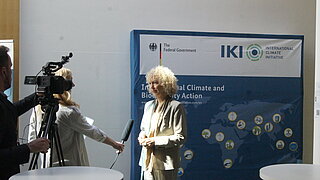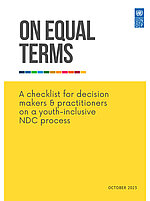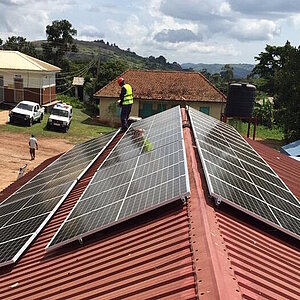Youth empowerment as a building block for effective climate and biodiversity action

Why is the participation of young people in climate and biodiversity conservation projects so important, and how can it best be organised? This was just one of the key issues addressed by the IKI brown bag lunch ‘Empowering Youth – Maximizing Impact: Youth empowerment as a building block for effective climate and biodiversity action’, held in September.
Numbering some 1.8 billion individuals, young people are the largest generation in history. In IKI partner countries in particular, young people make up a considerable proportion of the population, as Julia Dorbandt from the German Federal Ministry for Economic Affairs and Climate Action (BMWK) noted in her keynote. This group will not only be affected especially strongly by the effects of climate change but is already a relevant part of the solution. Over 60 IKI projects therefore focus on integrating and empowering young people, whether by raising awareness, with capacity building or via direct involvement in policymaking processes.
Successful examples: Green Youth Labs and Climate Promise
A prime example of successful youth involvement has been provided by the Green Youth Labs project in Viet Nam, which was implemented by the Friedrich-Ebert-Stiftung (FES). This project offers young people a two-stage training programme while also supporting them with project microfinancing for a just energy transition. Personal success stories from young people living in the Mekong Delta and Hanoi have shown how the programme has not only helped personal development but also boosted international engagement and local implementation. One particular highlight is the open letter on the just energy transition from project participants, which serves as the basis for dialogue with the government and private enterprise. Building on this, the project is funding the attendance of a youth representative at this year’s UNFCCC COP.
The global Climate Promise initiative from UNDP is supporting youth engagement with the design and implementation of nationally determined contributions (NDCs) in a number of countries. Thanks to national initiatives like Panama’s Climate Change Academy or youth delegations and training programmes in the context of UN climate negotiations, young people are being integrated into policymaking processes. As one example, Thailand’s NDC and national adaptation plan (NAP) are now more strongly oriented towards the needs of young people. The project underlines the importance of sustainable structures for long-term youth engagement and inclusive participation processes.
Challenges and solution strategies
A lively closing discussion with participants addressed the challenges of achieving stronger youth engagement as well as some potential solution strategies. The importance of an inclusive and accessible project approach was emphasised, which would enable participation by all young people, particularly those from marginalised groups and regions. It became clear that close cooperation with local partners such as universities, NGOs and community groups is needed to overcome these potential barriers. In addition, there were calls for an intersectional approach, which would also take into account gender differences or the needs of indigenous groups.
The examples from practice, taken from the broad-based programme of support projects offered by the IKI, highlight the relevance and impact of youth activities, at both a local and global level. This knowledge sharing event between IKI projects and the more than 60 participants was valuable and will be repeated in the future, especially in light of the institutionalisation of youth engagement both within the IKI and beyond.
The link has been copied to the clipboard
Contact
IKI Office
Zukunft – Umwelt – Gesellschaft (ZUG) gGmbH
Stresemannstraße 69-71
10963 Berlin
Presentation IKI BBL
The presentation slides from the event are available for download here.
IKI topic page
Related Videos








![[Translate to English:] Cover Elevating Meaningful Youth Engagement for Climate Action](/fileadmin/_processed_/d/4/csm_20230224_UNDP-Elevating-Meaningful-Youth-Engagement-for-Climate-Action_Cover_969fd0113b.jpg)









